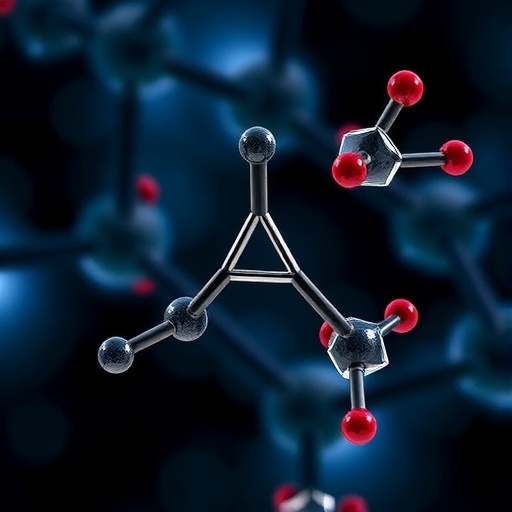Recent research in the field of medicinal chemistry has unveiled an exciting prospect in the development of novel therapeutic agents targeting Alzheimer’s disease and certain mood disorders. Among these findings, a pivotal study spearheaded by researchers Zhang, Li, and Shao has emerged, exploring the potential of new tricyclic tetrahydropyridothienopyrimidinone derivatives as dual inhibitors for acetylcholinesterase (AChE) and monoamine oxidase B (MAO-B). This innovative approach utilizes molecular docking techniques to design compounds that could potentially revolutionize treatment strategies for neurodegenerative diseases.
Alzheimer’s disease remains a pressing global health concern, affecting millions and posing considerable challenges in effective treatment. Current therapies primarily target neurotransmitter deficits, specifically acetylcholine, through the inhibition of AChE. However, these treatments often fall short in addressing broader neurobiological dysfunctions associated with the disease. Thus, the search for dual inhibitors is critical, as these compounds can simultaneously enhance cholinergic signaling while modulating other neurochemical pathways intricately linked to cognitive decline.
The researchers’ study builds on the well-established roles of AChE and MAO-B in the central nervous system. AChE is primarily responsible for the breakdown of acetylcholine, a neurotransmitter vital for learning and memory. Conversely, MAO-B is involved in the degradation of neurotransmitters such as dopamine. Elevated MAO-B activity has been correlated with neurodegenerative processes, making it an appealing target alongside AChE in the quest for multifaceted treatment options.
Utilizing advanced molecular docking methodologies, the team designed and synthesized a series of tricyclic tetrahydropyridothienopyrimidinone derivatives. This structural complexity is crucial, as it allows for multiple interaction sites with target enzymes, enhancing the potential efficacy of the compounds. The researchers meticulously analyzed these interactions, gauging the binding affinities to propose a range of optimal candidates for experimental validation.
The innovative aspect of this research lies not only in the design of these derivatives but also in their predicted dual-action mechanism. By concurrently inhibiting AChE and MAO-B, these compounds may mitigate the loss of cholinergic transmission while simultaneously preserving dopaminergic signaling. This dual approach could provide a significant therapeutic advantage, potentially slowing disease progression and improving cognitive function.
To validate the computational findings, the researchers proceeded with in vitro assays, assessing the inhibitory activities of the synthesized compounds. Preliminary results indicated promising activities against both AChE and MAO-B, substantiating the theoretical predictions made during the docking studies. These findings open the door to further investigation into the pharmacodynamic and pharmacokinetic properties of these candidates.
Moreover, understanding the safety profiles and possible side effects of these novel derivatives is as crucial as their efficacy. The research team has laid the groundwork for future studies focusing on the metabolic pathways and possible toxicity associated with the new compounds. Preliminary assessments of safety are paramount in the drug development process, ensuring that the benefits outweigh any potential risks before advancing to clinical trials.
As the study progresses, there is hope that these compounds will eventually translate into meaningful clinical applications. The broader implications of the findings may extend beyond Alzheimer’s disease, opening avenues for the treatment of other neuropsychiatric disorders where cholinergic and dopaminergic imbalances are observed.
The rise of dual-action inhibitors represents a paradigm shift in drug discovery. Rather than developing single-target agents, a more holistic approach that considers the complex interplay of neurotransmitter systems could provide more effective therapies. As the scientific community continues to unravel the intricate mechanisms underlying neurodegeneration, findings such as these offer a beacon of hope.
In conclusion, the research conducted by Zhang, Li, and Shao marks a significant advancement in neuropharmacology. Through the integration of cutting-edge molecular docking techniques with innovative compound design, this study exemplifies the potential for novel therapeutic agents to address multifaceted neurological disorders. The journey from laboratory research to clinical application is long and complex, but the promise held by these tricyclic tetrahydropyridothienopyrimidinone derivatives offers optimism in the quest for effective treatments against cognitive decline and mood disorders.
As the scientific community watches closely, this groundbreaking research may lead to a new generation of dual-inhibitor drugs, redefining therapeutic strategies for neurodegenerative diseases and significantly improving the quality of life for millions affected by these conditions.
Subject of Research: Development of dual inhibitors as therapeutic agents for Alzheimer’s disease.
Article Title: Molecular docking-based design of novel tricyclic tetrahydropyridothienopyrimidinone derivatives as AChE/MAO-B dual inhibitors.
Article References:
Zhang, J., Li, Y., Shao, JD. et al. Molecular docking-based design of novel tricyclic tetrahydropyridothienopyrimidinone derivatives as AChE/MAO-B dual inhibitors.
Mol Divers (2025). https://doi.org/10.1007/s11030-025-11354-9
Image Credits: AI Generated
DOI: 10.1007/s11030-025-11354-9
Keywords: Alzheimer’s disease, dual inhibitors, acetylcholinesterase, monoamine oxidase B, molecular docking, neuropharmacology, neurotransmitters, cognitive decline.




